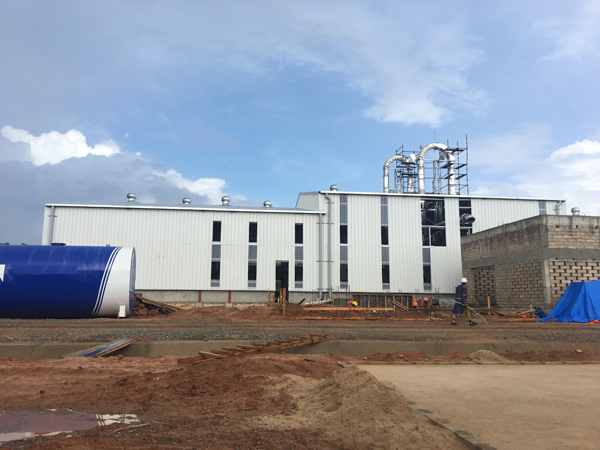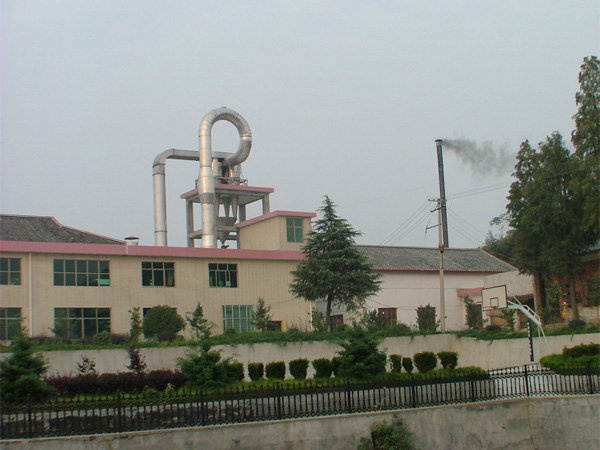Cassava production and processing in nigeria
Cassava is the most important root crop in Nigeria. In Nigeria, only cassava accounts for about 45% of Nigeria's agricultural GDP, mainly for food or household use, but its industrial processing and utilization of cassava production and processing in nigeria is very limited.
According to FAO statistics, the current annual output of cassava in the world is 250 million tons, and the output value is 100 billion US dollars, more than half of it is produced in Africa. Nigeria is the world's largest cassava producer with an annual output of 45 million tons and an output value of 18 billion US dollars, accounting for one third of the total production in Africa. Most of the populations in Africa, Latin America and Asia depend on cassava for their livelihoods because cassava provides food and business opportunities for farmers and traders.
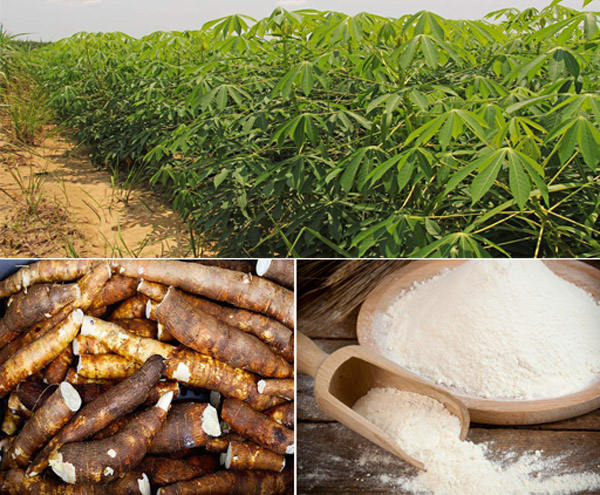 Cassava production and processing in Nigeria
Cassava production and processing in Nigeria
In some parts of Africa, cassava accounts for more than 50% of people's daily diet. Among all African countries, cassava production and processing in nigeria ranks first, accounting for about one-fifth of the world's cassava production. Cassava is easy to grow in arid areas with very limited rainfall, and Nigerian farmers choose cassava for their stubborn viability in drought. It is estimated that by 2020, cassava production and processing in nigeria will double, but currently 90% of cassava is consumed in Nigeria. However, the demand for high-quality cassava starch prompted them to establish some cassava starch industry. At present, Nigeria's high-quality cassava starch industry is mainly small-scale, and the end users of cassava starch are mainly in food industry like Nigerian flour mills.
Traditionally, cassava is one of the main foods of Nigerian farmers, and it is also widely consumed in other African countries. Cassava roots are used to make different types of local foods such as starch, ethanol, tapioca and garri. Nigerians say that if cassava production and processing in nigeria is commercialized, cassava may even replace the status of oil, which will boost their economy and create jobs.
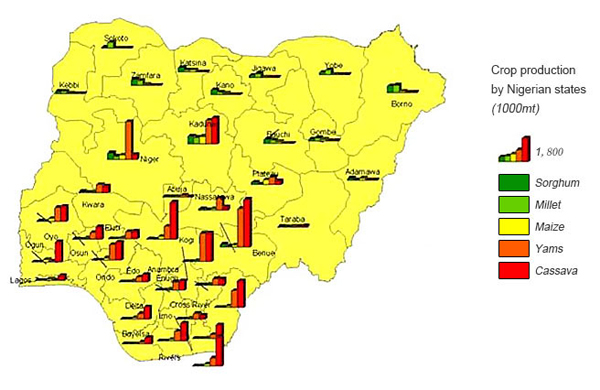 Crop yields in Nigerian states
Crop yields in Nigerian states
However, in fact, the current industrialization and commercialization of the cassava production and processing in nigeria is seriously inadequate. At present, the annual demand for cassava starch in Nigeria is estimated at 350,000 tons, while the national supply is estimated to be about 300,000 tons. It is understood that cassava starch is an important product of cassava after processing. The cassava root is washed and broken, and then the wet slurry is squeezed to extract the liquid for drying. The cassava starch will remain after the water is removed from the wet slurry. This starch is then used in the food, paper, textile industry, and mineral wool and clay industries.
In order to promote the industrialization of the cassava production and processing in nigeria, Nigeria has launched a government initiative that “containing at least 10% of cassava flour in bread” has achieved great success. Most importantly, the policy of adding 10% casava flour to bread and other sweets has made the cassava industry a “gold mine” that employs millions of Nigerians to provide income for farmers and a large number of processors. A direct consequence of the policy of introducing 10% cassava flour in bread is the need for Nigerian flour processing companies to add 300,000 tons of high quality cassava flour per year.
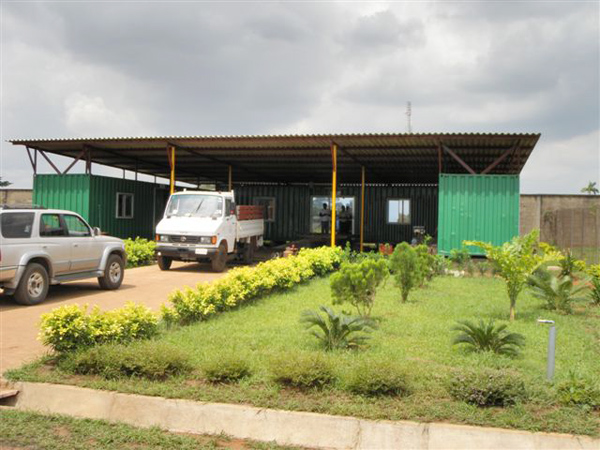 Cassava processing plant in nigeria
Cassava processing plant in nigeria
Currently, because the federal government wants to reduce import dependence and save scarce foreign exchange, a national program aims to increase the production of cassava starch to replace corn starch. Nigeria's demand for cassava starch is high, and the driving force behind this demand is the government's policy on replacing cornstarch with cassava starch.
If the potential of cassava is properly released, the cassava industry may be more likely to help Nigeria's industrialization than any other industry. It is in recognition of this fact that the Nigerian government has prioritized the cassava cultivation, cassava production and processing and cassava export in the past few years, which led to the cassava revolution in Nigeria.
In the past ten years, the use of cassava has become more and more extensive. The United States and South Africa have great market demand for cassava for feed, while for Europe and the United States, the demad for cassava starch is large. The United Kingdom, Japan and China have also shown great interest in importing cassava from Nigeria. In the face of the huge demand in the international market, cassava production and processing in nigeria is very profitable.
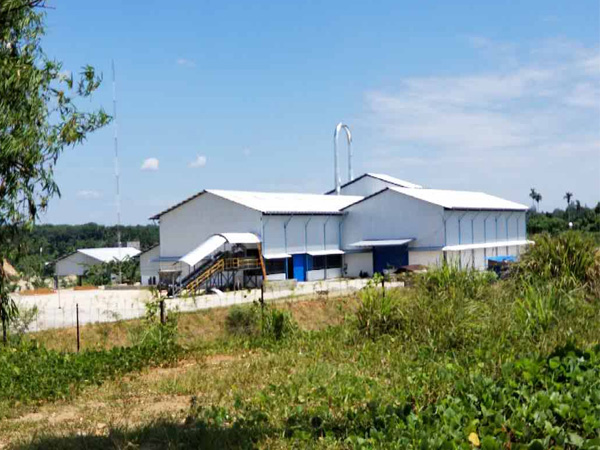
-
 Cel/WhatsApp: +8613526615783
Cel/WhatsApp: +8613526615783
-
 Phone: +86 371 5677 1822
Phone: +86 371 5677 1822
-
 E-mail: market@doingmachinery.com
E-mail: market@doingmachinery.com
-
 Address: Room 1408,14th Floor,Building 9,No.133 Yaozhai Road,Jinshui District,Zhengzhou City,Henan Province,China
Address: Room 1408,14th Floor,Building 9,No.133 Yaozhai Road,Jinshui District,Zhengzhou City,Henan Province,China
Related Projects
Contact Us

Want to know more about our products or services? Fill out the contact form below, and we’ll to get back to you and you will get the price list. Please also feel free to contact us by email or phone.( * Denotes a required field).
- Do you want to buy machine?
- Yes, I want to buy machine
- No, I want to learn more in advance.
- What is your raw material?
- Cassava
- Potato
- Sweet potato
- Other:
- What is the final product you want to produce?
- Chips
- Flour
- Starch
- What is the final product you want to produce?
- Garri
- Cassava flour
- Cassava starch
- Cassava chips
- Attiekie
- Bammy
- Other:
- What is your planned capacity for final product?
- <1 ton per day
- 1 ton per day
- 2 tons per day
- 3 tons per day
- 3-10 tons per da
- 10-20 tons per day
- >20 tons per day
- What is the usage of your cassava chips?
- Food usage (like fried chips, flour)
- Industrial usage (like animal feeds, ethanol)
- What is your planned capacity for final product?
- <5 ton per hour
- 5-10 tons per hour
- >10 tons per hour
- What is your planned capacity for final product?
- <500 kg per hour
- 0.5-5 ton per hour
- 5-10 ton per hour
- >10 ton per hour
- What is your planned capacity for final product?
- <300 kg per hour
- 300-1000 kg per hour
- 1-5 ton per hour
- 5-10 ton per hour
- >10 ton per hour


